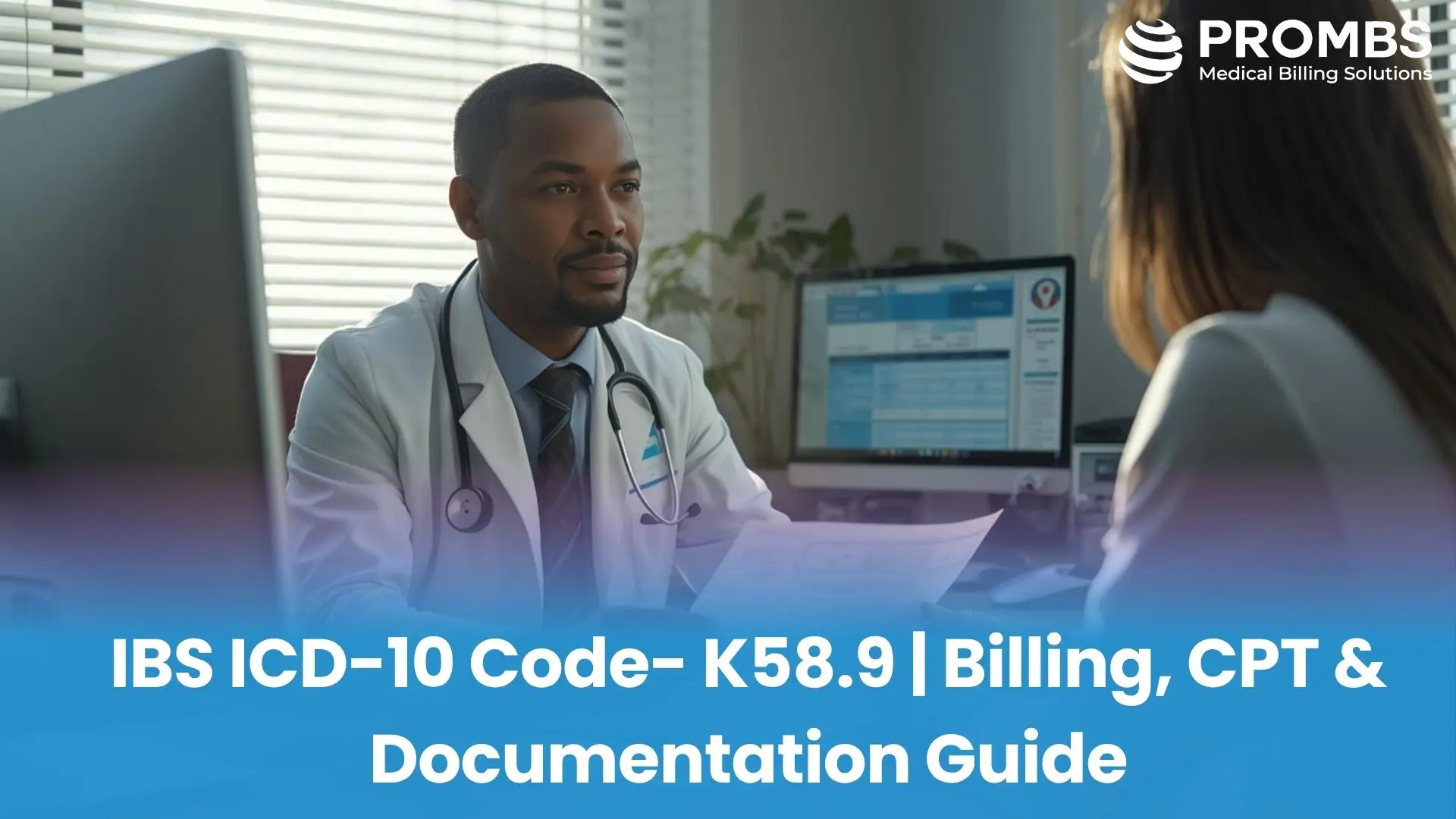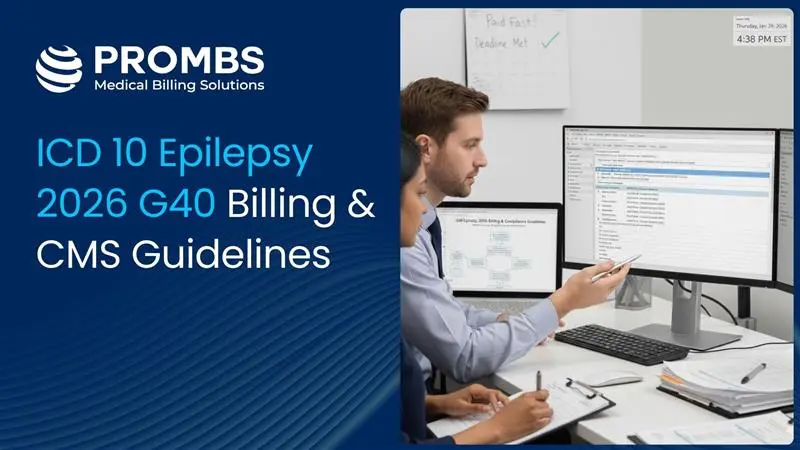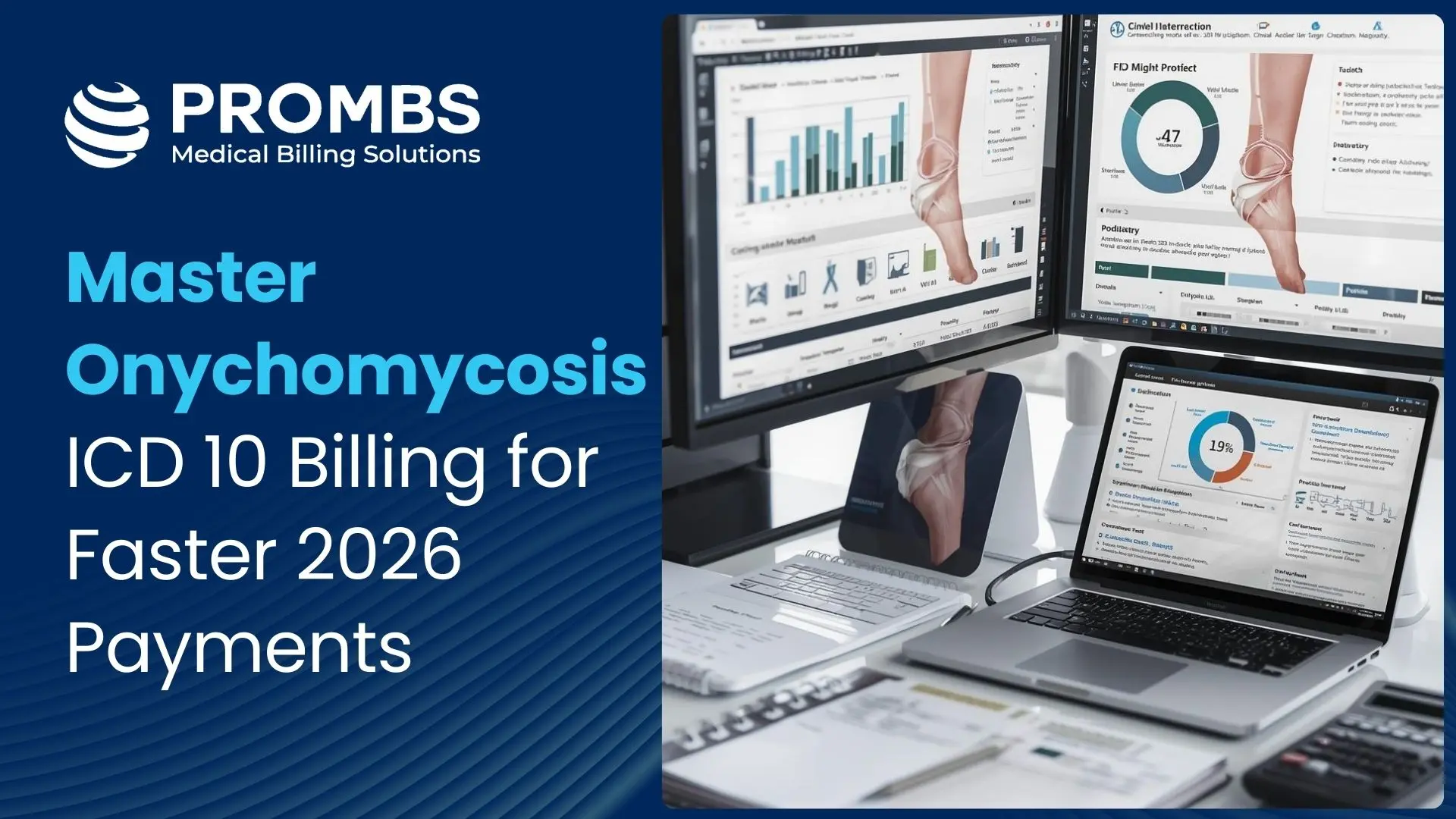Irritable Bowel Syndrome (IBS) is one of the most common gastrointestinal diagnoses worldwide, but it is also one of the most scrutinized when it comes to billing and reimbursement. According to the National Institute of Diabetes and Digestive and Kidney Diseases (NIDDK), IBS affects up to 12% of adults in the United States and remains a leading cause of referrals to gastroenterologists.
For providers and billers, IBS sits at the crossroads of clinical complexity and payer oversight. Coders must navigate between multiple ICD-10 categories under K58, avoid unspecified use when possible, and align CPT services with the right diagnosis narrative. Inaccurate coding can lead to denials, payer audits, and even downstream compliance risks flagged by agencies like the Office of Inspector General (OIG).
This guide breaks down the icd 10 code for ibs, its documentation requirements, related CPT pairings, denial prevention strategies, and why expert billing support from PROMBS can make the difference between clean claims and costly appeals.
What is IBS and what symptoms support accurate coding?
IBS is a functional gastrointestinal disorder, meaning it causes chronic symptoms without identifiable structural disease. The American College of Gastroenterology (ACG) defines IBS as recurrent abdominal pain associated with changes in stool frequency or form, often accompanied by bloating, urgency, or incomplete evacuation.
Common symptoms providers must document
- Abdominal pain at least 1 day per week over the past 3 months.
- Symptoms linked with changes in stool form (diarrhea, constipation, or alternating).
- Relief or worsening of symptoms after bowel movements.
When providers fail to tie these documented symptoms to Rome IV criteria, insurers may argue the diagnosis is not fully supported, which can increase denial risk.
Understanding IBS and Why It Matters in Medical Billing?
IBS is a functional gastrointestinal disorder characterized by abdominal pain, bloating, and altered bowel habits such as diarrhea, constipation, or both. Unlike structural diseases like Crohn’s or ulcerative colitis, IBS does not cause visible damage to the intestine, but its symptoms significantly impact patient quality of life.
From a clinical perspective, providers focus on symptom management with dietary changes, lifestyle adjustments, and medications. From a billing perspective, IBS represents a diagnosis-driven condition: reimbursement depends on coding specificity, especially when linked to services like colonoscopies, office visits, or lab testing.
Did You Know? According to the American College of Gastroenterology (ACG), IBS is the second most common cause of missed workdays in the U.S., highlighting its economic and billing impact on healthcare systems.
The ICD-10 Code for IBS and Its Correlation
The official ibs icd 10 code is K58.9 – Irritable bowel syndrome without diarrhea. This code is applied when a provider documents IBS but does not indicate whether diarrhea, constipation, or mixed bowel patterns are present. However, ICD-10 includes multiple subcategories (K58.0–K58.9) that allow providers and billers to capture more specific clinical details.
Choosing the right IBS ICD-10 code is not just about accuracy in medical records, it directly impacts billing and reimbursement. For example, payers may deny diagnostic procedures such as colonoscopies if the claim is submitted with K58.9 (unspecified) when the patient clearly meets criteria for K58.0 (IBS with diarrhea) or K58.1 (IBS with constipation). The Centers for Medicare & Medicaid Services (CMS) and other insurers expect coders to use the most specific code available to justify medical necessity.
For coders and providers, this means that IBS must always be documented with subtypes when possible, not just as “IBS.” Doing so reduces denials, ensures correct CPT linkage, and strengthens compliance in the event of audits.
The ICD-10 code for IBS is K58.9 (Irritable bowel syndrome without diarrhea) when unspecified. More specific subcodes exist:
CD-10 Codes for IBS
| ICD-10 Code | Description | When to Use |
|---|---|---|
| K58.0 | IBS with diarrhea | Documented diarrhea-predominant IBS (IBS-D) per NIDDK. |
| K58.1 | IBS with constipation | Documented constipation-predominant IBS (IBS-C). |
| K58.2 | Mixed IBS | Alternating constipation and diarrhea (IBS-M). |
| K58.9 | IBS, unspecified | Only when subtype cannot be determined, frequent overuse can cause denials flagged by CMS. |
This table helps coders choose the most precise diagnosis code and avoid unnecessary payer scrutiny.
Did You Know? The World Health Organization (WHO) estimates that functional gastrointestinal disorders like IBS account for more than 40% of gastroenterology outpatient visits globally, highlighting both the prevalence and the financial importance of accurate coding.
Which ICD-10 Chapter Includes IBS?
IBS codes belong to Chapter XI: Diseases of the Digestive System (K00–K95) in ICD-10. This chapter covers gastrointestinal and hepatology diagnoses, which are among the highest-volume and most closely monitored by payers.
Because of its high prevalence and overlap with conditions like inflammatory bowel disease (IBD) and celiac disease, payers often require clear differentiation in the clinical notes. Using K58.9 as a blanket diagnosis without explaining why IBD was ruled out can result in claim denials, especially under Medicare’s Program Integrity Manual.
For coders and billers, knowing the chapter structure is essential because it helps prevent misclassification errors. IBS is a functional disorder, it is not coded under infectious causes, inflammatory bowel disease, or hernias. Misplacing IBS in claims under the wrong category may trigger payer denials or medical necessity disputes. CMS and commercial payers often cross-check ICD-10 coding at the chapter and block level to ensure claims align with the patient’s documented condition.
By correctly assigning IBS codes under the digestive system chapter, providers protect reimbursement and ensure claims meet compliance requirements.
Did You Know? The National Institutes of Health (NIH) estimates that up to 20% of gastroenterology outpatient visits are related to IBS, making it one of the most high-volume diagnoses in GI billing.
Which CPT Codes Pair with the ICD-10 Code for IBS?
CPT services must support the diagnosis to demonstrate medical necessity. For IBS, this often includes E/M visits, diagnostic colonoscopy, or counseling.
CPT Codes Commonly Paired with IBS
| CPT Code | Description | Billing Note |
|---|---|---|
| 99213 / 99214 | Office visit, established patient | Document time spent on counseling for IBS diet or symptom management. |
| 45378 | Diagnostic colonoscopy | Used when ruling out structural disease; must be justified with IBS documentation per AMA CPT guidelines. |
| 91010 | Esophageal motility study | Sometimes used in differential workup of IBS-like symptoms. |
| 96156 | Health behavior assessment | Used for counseling on stress-related IBS triggers. |
Correct pairing reduces denials and ensures payment aligns with clinical services.
In medical billing, every diagnosis code must be paired with a corresponding procedure or service code to establish medical necessity. For IBS, this means the ibs icd 10 code (K58.0–K58.9) must align with procedures like colonoscopies, office visits, lab panels, and behavioral health therapies. If the wrong pairing is made, or if the claim is submitted with K58.9 (unspecified IBS) when a more specific subtype is documented, payers often deny the claim or request additional documentation.
Accurate ICD-10 to CPT linkage is critical because IBS management often involves multi-specialty care, gastroenterology, primary care, nutrition, and behavioral health. Each specialty bills different CPT codes, but they must all connect back to the same IBS diagnosis for claims to be approved. As per CMS guidelines, insurers carefully check this linkage to confirm that the billed services match the patient’s documented IBS condition.
Did You Know? The American Medical Association (AMA) emphasizes that colonoscopy CPT codes must always be linked to an appropriate ICD-10 code like K58.x (IBS) or payers will deny coverage as “not medically necessary.”
How does treatment impact coding and billing for IBS?
Treatment plans for IBS are highly individualized, which makes documentation essential. According to the American Gastroenterological Association (AGA), first-line management includes dietary changes (such as low FODMAP diets), fiber supplements, and behavioral therapy. Medications may include antispasmodics, laxatives, or anti-diarrheal drugs.
When a patient is prescribed medications like linaclotide (IBS-C) or rifaximin (IBS-D), payers often request documented proof of failed conservative management. Failing to include this progression in the notes can trigger medical necessity denials.
How Should IBS Documentation Be Structured to Avoid Denials?
Core elements to document Symptom onset and duration.
- Specific subtype (IBS-D, IBS-C, IBS-M).
- Tests performed to rule out IBD or infections.
- Treatment plan progression (diet → meds → advanced therapies).
The AHIMA stresses that insufficient documentation is one of the leading causes of improper billing in GI claims, which can invite payer audits and revenue loss.
Denials often occur when payers believe IBS was coded too broadly, or when medical necessity is not demonstrated. According to the HFMA, denial prevention requires aligning documentation, diagnosis codes, and CPT services in a way that tells a complete story.
Compact Denial-Prevention Matrix for IBS
| Risk Area | Common Denial Trigger | Prevention Strategy |
|---|---|---|
| Coding | Use of K58.9 too often | Document subtype and link to clinical findings (CMS). |
| Medical necessity | No failed conservative therapy before meds | Document diet, lifestyle changes, and OTC treatments tried. |
| CPT linkage | Colonoscopy billed without differential diagnosis | Link CPT 45378 to clinical rationale documented in chart (AMA). |
How to distinguish IBS from other disorders
Clinicians often struggle to separate IBS from conditions like celiac disease, inflammatory bowel disease (IBD), or functional dyspepsia. The Mayo Clinic emphasizes that stool studies, bloodwork, and imaging are often needed to exclude other diagnoses.
Differential Diagnosis Comparison
| Condition | Key Feature | Distinction from IBS |
|---|---|---|
| IBD (Crohn’s/UC) | Structural inflammation | Endoscopy shows ulceration; IBS shows normal mucosa. |
| Celiac disease | Gluten sensitivity | Serologic testing positive in celiac, negative in IBS (CDC). |
| Functional dyspepsia | Upper GI pain/bloating | Symptoms centered in stomach, not lower bowel. |
| Lactose intolerance | Food-triggered diarrhea | Hydrogen breath test positive, absent in IBS. |
Did You Know? According to a KFF analysis, Medicare spends billions annually on gastrointestinal conditions, with IBS being one of the top contributors to outpatient utilization.
Why Should Providers Partner with PROMBS for IBS Billing and Coding?
IBS billing is not just about code selection; it’s about building a defensible claim. PROMBS specializes in gastroenterology billing, denial management, and compliance, helping providers reduce AR days and avoid payer audits.
Our experts use advanced denial-prevention workflows, AI-driven claim scrubbing, and deep knowledge of GI coding standards to ensure maximum reimbursement. With PROMBS, practices get more than billing support, they gain a strategic partner in compliance and financial performance.



